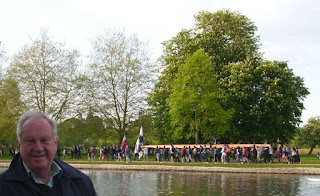I have, for many years, held a fast a few days
before Christmas. I start at around midnight and take nothing but water (warm
water) for thirty-six hours or so until I break my fast with breakfast. I have
written about this before, but cannot resist doing so again.
Why do I do it? I'm not entirely sure. I once
worked with a man called Aziz Ratansi. An interesting fellow, he told me that
he had once suffered from depression and had cured himself by fasting. This
intrigued me. Besides, I think we all eat too much; it becomes a habit rather
than a necessity or a pleasure. Also, admiring the iron will of great men like
Gandhi I wanted to experience starvation, at least the early stages, for
myself. And, again, my fast is a counterpoint to the coming overindulgence of
Christmas. Strangely, over the years, it has become part of Christmas for me.
I fast alone. I do not mean that I isolate myself
in a darkened room or walk off into a dark forest: I just carry on as normal.
However, on one occasion my eldest son joined me. He did well until the
twenty-fourth hour when he hungrily scoffed everything that he had missed
during the day! I am told that I become grumpy during my fasting day - an
accusation that I angrily deny. I am taunted sometimes. Years ago, my sons
would come to find me after a meal, describe what they had eaten then blow food-laden
breath into my face. I almost broke down when they had been eating baked beans.
Breaking the fast has become ritualistic. I
carefully prepare my food then lay it out in front of me: cereal bowl to the
fore, banana behind, fruit juice to the right, herbal tea beyond. The radio
must be turned off and I do not read (I usually do read at breakfast time)). I
then sit quietly for a few minutes studying my inner feelings: the slight
discomfort in my stomach, the metallic taste in my mouth, the very mild headache. Then, slowly, I raise the glass of juice to my lips. This year I
drank cloudy apple juice - glorious. The first sip, so strong in taste, slowly travels
over my taste buds gradually invading my entire mouth- wonderful. Then the warm
crunchiness of the pecan and maple cereal, so sweet, so textured, so satisfying.
Then the ceremonial stripping of the
banana, that wonderful fruit that nature supplies pre-packed, its texture so soft
and dense in contrast to the cereal, its flavour unique and delicious. Finally
the tea: fennel tea. I drink it every morning and am usually barely aware of it,
but on this day my awareness is at a peak, I am instantly conscious of an
overwhelming sweetness which almost hides the subtle flavour of fennel, perhaps
I should not add the sweetener tablet on fast days.
And then it is all over, I have done it again,
back to normal. Fasting is not easy to do, and does not get easier with
practice, but I will do it again. It is sort of cleansing, I believe. And it
suits my mental outlook. I shall enjoy Christmas all the more for having
fasted. Roll out the beer and brandy, the immense roast dinner followed by
unneeded Christmas pud, chased down by cheese and port. Mouth-watering.
































